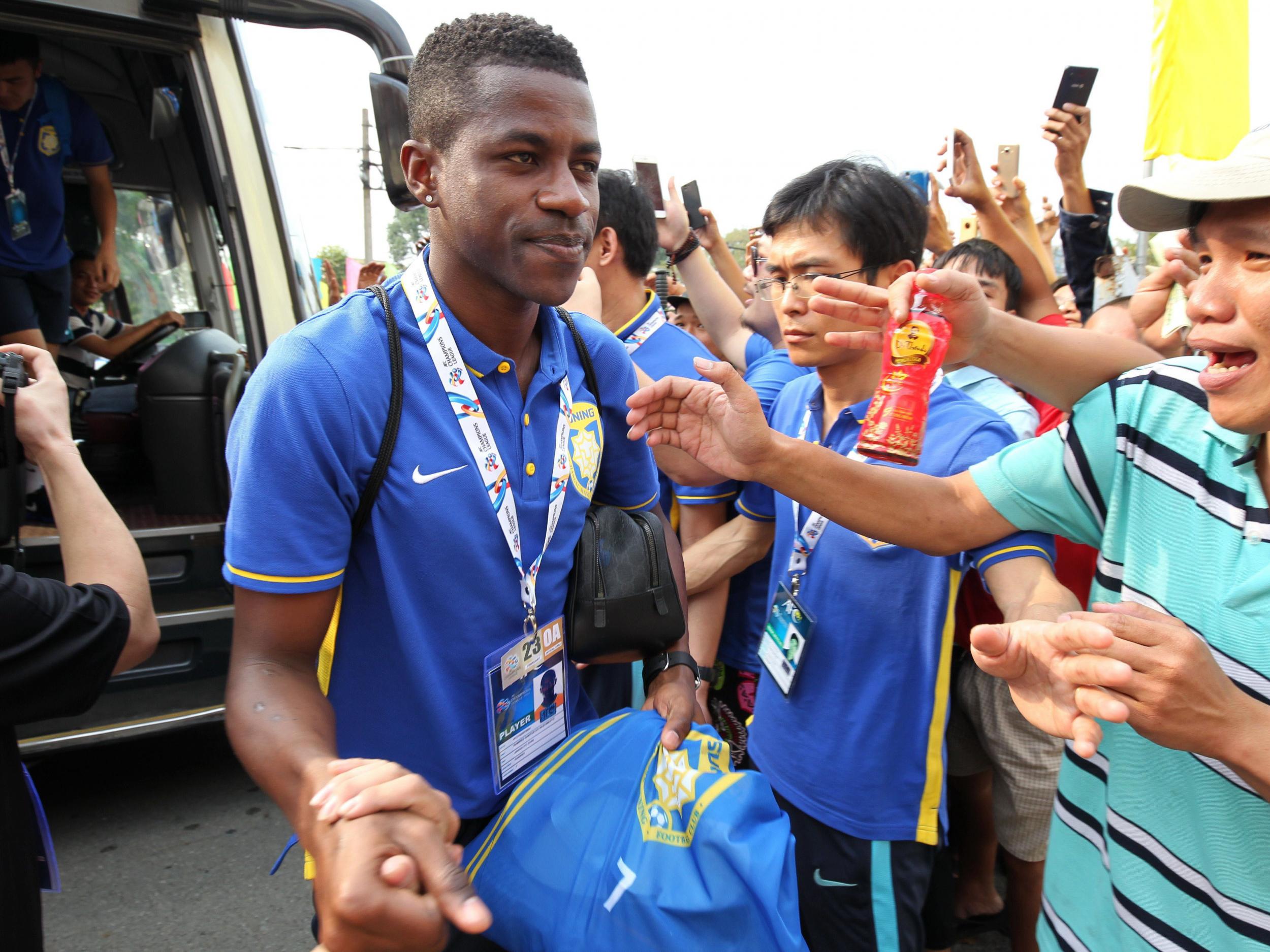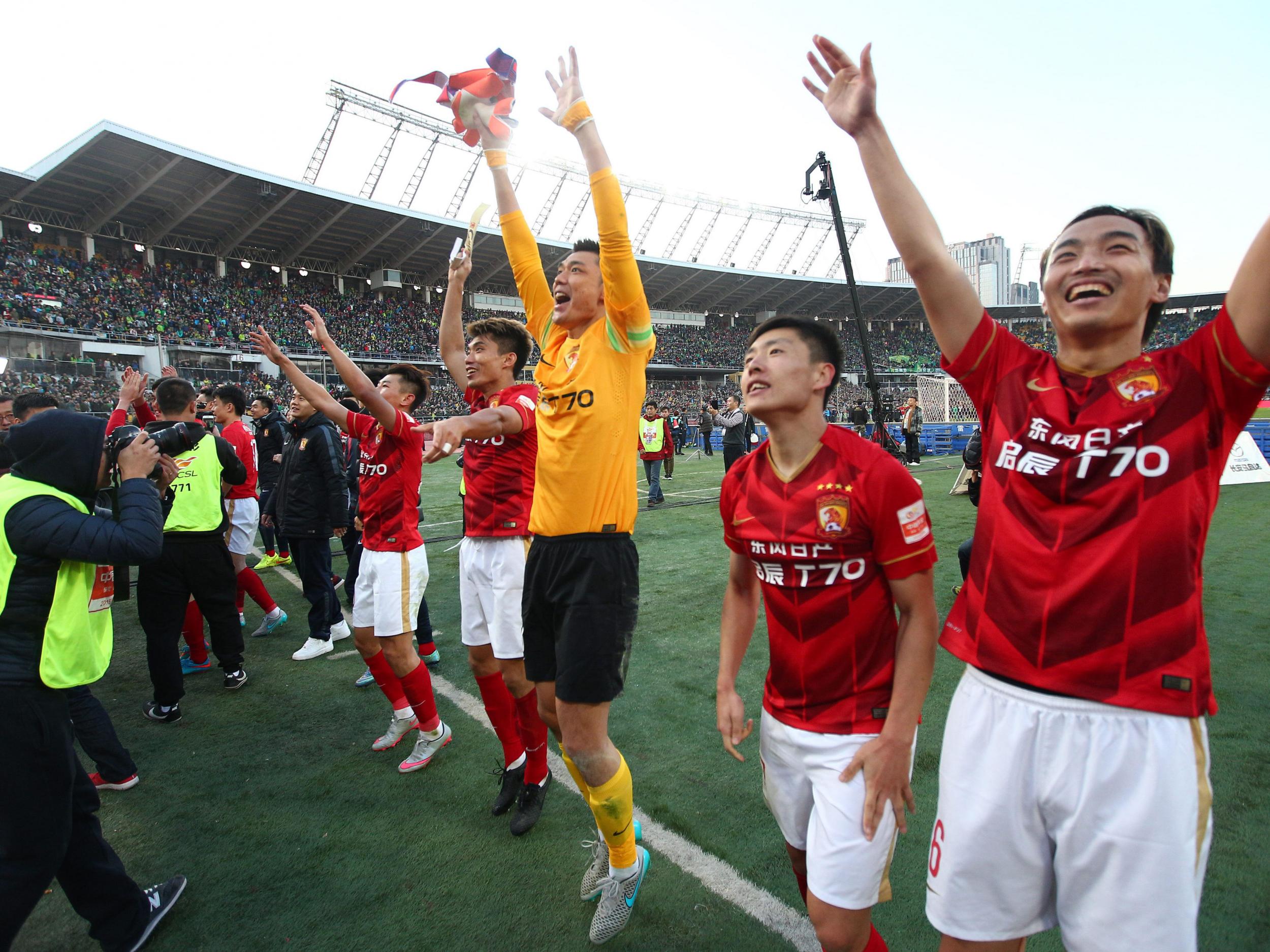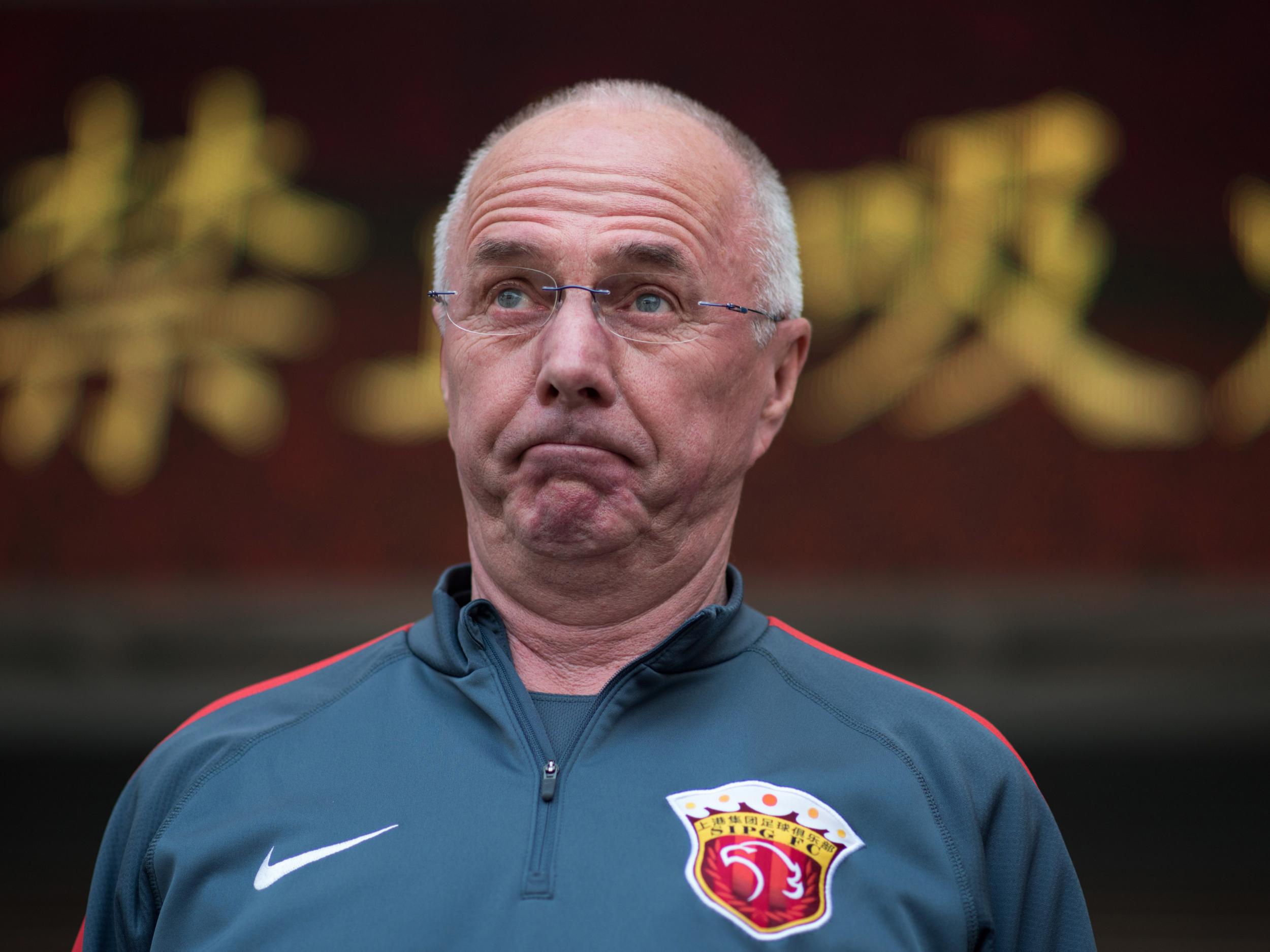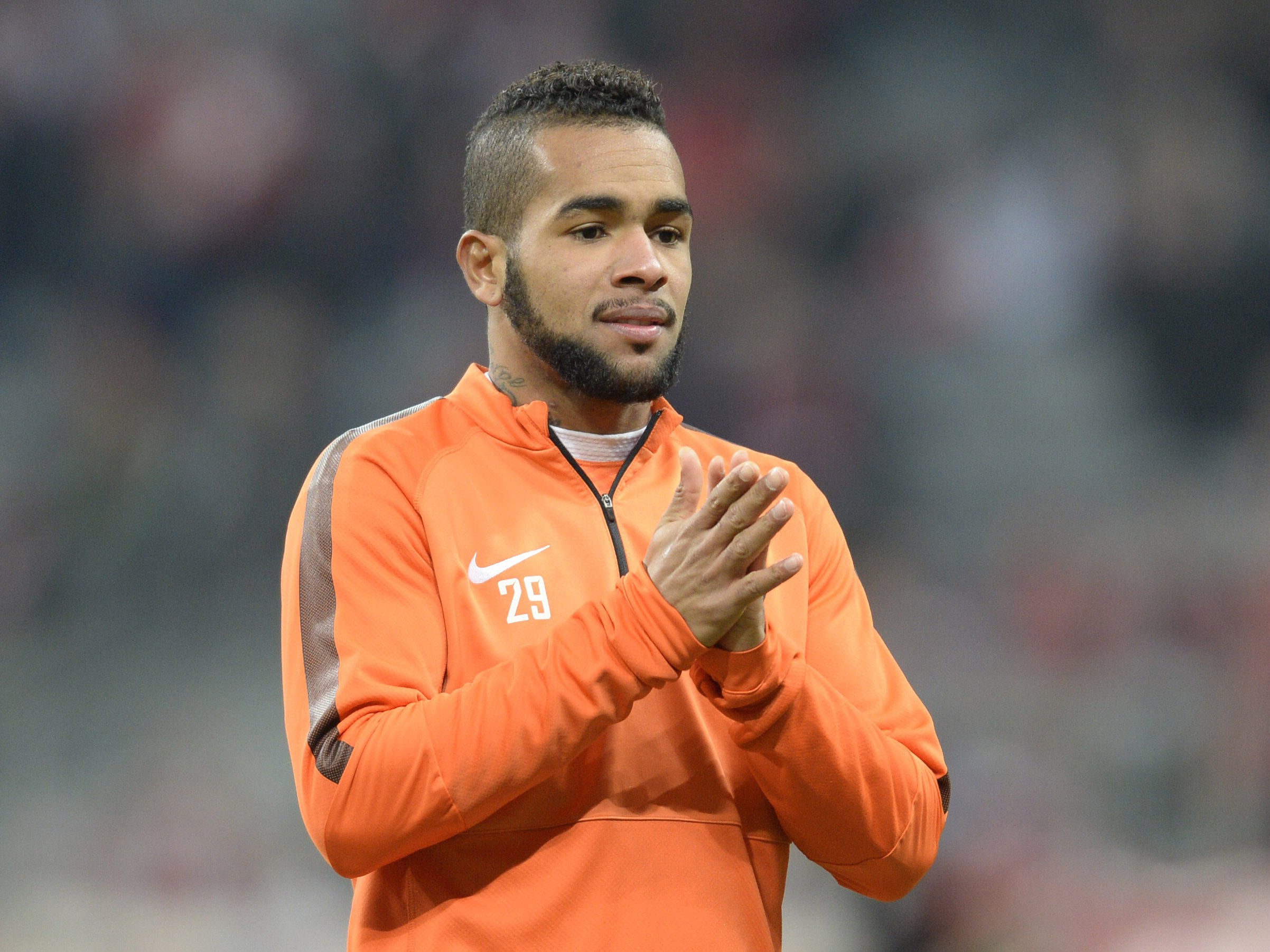Chinese Super League: Why European football's top talents are answering the great call of China
When the Chinese football season kicks off this week, it will boast more big names earning greater mind-boggling sums than ever. As players around the world hurry to join the gold rush, Michael Walker asks where the nation’s decision to flex its huge economic muscle came from and where it will leave the global game

Your support helps us to tell the story
From reproductive rights to climate change to Big Tech, The Independent is on the ground when the story is developing. Whether it's investigating the financials of Elon Musk's pro-Trump PAC or producing our latest documentary, 'The A Word', which shines a light on the American women fighting for reproductive rights, we know how important it is to parse out the facts from the messaging.
At such a critical moment in US history, we need reporters on the ground. Your donation allows us to keep sending journalists to speak to both sides of the story.
The Independent is trusted by Americans across the entire political spectrum. And unlike many other quality news outlets, we choose not to lock Americans out of our reporting and analysis with paywalls. We believe quality journalism should be available to everyone, paid for by those who can afford it.
Your support makes all the difference.It was mid-afternoon in England, just past midnight in China and Pei Rao, a 23-year-old postgraduate student at Durham University, was on social media. Pei was informing friends and family back in Zhengzhou that he had just been to watch Sunderland beat Manchester United.
“It was a great game,” Pei said. “Manchester United were maybe more skilful, Sunderland were brave.”
This is the modern world and, in football, China is now a player. Next Friday night in the southern province of Guangdong, Guangzhou R&F kick-off the 2016 Chinese Super League season against Hebei China Fortune FC, and planet football will be aware as never before.
For clarification purposes, as well as metaphor, the R&F stands for “Rich” and “Force”. It is the name of the club’s owners, a property conglomerate.
In a country with a claim on inventing football – there is evidence of cuju, or “kickball” in China 1,000 years ago – money is causing a re-invention and the European transfer window of 2016 may come to be seen as the moment when Chinese football re-announced itself, the moment when Alex Teixeira, a target for Liverpool and seemingly bound for Anfield, instead turned east from Shakhtar Donetsk and joined Jiangsu Suning for the staggering fee of €50million (around £39.4m at today’s exchange rate, if slightly less then).

Europe has watched open-mouthed at the speed of this development – from Serie A to La Liga there are major clubs who could not afford such sums. Jiangsu date back to 1958 but it was only in late December when the club acquired the Suning suffix. Suning is the biggest electronics retailer in China and they mean business. They will host the League’s formal opening ceremony next Saturday.
Teixeira was moving to the same Suning-owned club that Chelsea’s Ramires had joined 10 days earlier – for £25m. Teixeira had just turned 26, Ramires is 28; this is not an end-of-career payday. “China had not seen this before,” Pei Rao says. “Ramires broke the Chinese transfer record [at the time] and he’s 28. This is not like Didier Drogba – he was 34 when he went to Shanghai.”
Similarly, when Hebei visit Guangzhou’s 18,000-capacity stadium on Friday, they will take some serious new acquisitions with them. Ezequiel Lavezzi has arrived from Paris St-Germain and cost £23m. Lavezzi is said to be earning £400,000 per week – after tax. These are life-changing figures (if true) and also career-changing. Admittedly Lavezzi is 30 but the forward could have been playing for PSG v Chelsea in the Champions League.
The former Arsenal striker Gervinho is at Hebei too, having moved from Roma, and as remarkable as any of this spike in activity is that, aged 24, the winger Gaël Kakuta has also moved to Hebei. Signed from Seville for around £5m, Kakuta, once of Chelsea, along with Stephane M’bia, once of QPR, complete a quartet from Europe who will be managed by former Everton midfielder Li Tie.
These are just a few of the known names in the Chinese Super League (CSL). Already there are Dan Petrescu, Fabio Cannavaro, Sven Goran Eriksson and Felipe Scolari. It was Scolari who signed Tottenham’s Paulinho, 26, for Guangzhou Evergrande last June. They have now been joined by Jackson Martinez, the former Porto goalscorer leaving Atletico Madrid for €42m (£33.1m today). Numerous others from Europe, such as Marcello Lippi, have been and gone. Given the money being discussed, and offered, this looks like a goldrush.
“A new El Dorado,” Dunga called it last year, the Brazil manager having seen 22 players from his country move to China by last March. It’s more now. Debt-laden Brazilian clubs are willing to take transfer fees, while players, and agents, have been convinced that the CSL – with government approval – is now financially stable in a way it was not before. There were allegations of unpaid wages for Drogba and Nicolas Anelka three years ago.
Attendances, too, are healthy, comparable with La Liga and Serie A at an average of about 22,000.
Government backing is fundamental to what is happening in China. The country’s President Xi Jinping is a football fan – apparently sincere – who assumed office not long after Drogba departed. Even before becoming president, Xi spoke of wanting China at a World Cup, then to stage it, then to win it. Almost 20 per cent of the world’s population is Chinese and Xi wants 11 of them to be good enough to rule the world by 2030.

In power, Xi has put muscle and finance behind achieving these goals. Football has been decreed a “strategy industry”. He has even placed football on the national curriculum.
The “Wild East” website about Chinese football, set up by Cameron Wilson from Dunfermline, has translated a Government decree: “The General Office of the State Council publishes the ‘Chinese football reform and development program’.”
In a lengthy scroll, the Government declared: “Throughout the country there are currently about 5,000 primary and secondary schools specialised in football. By 2020 this number is expected to reach 20,000, and by 2025 it will reach 50,000.”
Xi’s personal interest may be a factor but it would be naïve to think that China has not noticed the soft power and global influence states such as Qatar and the UAE have gained via sport. There is also a broad Chinese desire to interact with the world. Wilson, a Shanghai resident since 2005, says: “It’s not all about politics as everyone in Europe thinks.
“That is a big part of it, and Xi Jinping has put his personal weight behind football. You might even say he has put his personal credibility on the line since the problems in Chinese football are so deeply entrenched, it will take a generation to solve them completely.
“Basically, before, big business was backing football for political favour at local level. China is just like anywhere else – city majors want to have sports teams to represent their community. Then in the early 2010s the Government started cleaning football up in a big way and big business saw that investing in it had political benefits further up the food chain. Now it clearly does.”
Petty corruption, questionable playing standards and a poor national men’s team – the women were runners-up at the 1999 World Cup – have held China back. The men have reached just one World Cup finals, in 2002, when they lost all three group games without scoring. Xi wants to change that from the top down but Pei says it is already changing from street level.
He cites the last World Cup when he and all the people he knew stayed up to watch the games from Brazil, first at 3am, then 6am. “This affected a lot of people,” Pei says. “Brazil losing to Germany was big news in China, almost front-page news.” Pei adds that watching 3 o’clock Saturday kick-offs from England – at midnight in Zhengzhou – “is becoming more common. Some websites and TV are free. Football is already very big, maybe already the biggest sport – basketball, tennis, ping-pong are all popular in China. The Premier League, Bundesliga and La Liga are all famous in China. There’s no doubt Messi and Cristiano Ronaldo are the most popular.”
Wilson agrees that there had been a stimulation of interest pre-dating Xi’s presidency – “Xi has just formalised and accelerated this process” – and while there is a focus on the CSL today, there has been evidence of increasing interest in football beyond China.

Shortly after Xi’s visit to Manchester City in October, it was announced that China Media Capital had bought 13 per cent of City for £265m. That came 10 months after a Chinese billionaire, Wang Jianlin, bought 20 per cent of Atletico Madrid for £34m.
Espanyol are 56 per cent owned by a Chinese company. Last year also saw another Chinese investor buy a majority stake in Slavia Prague, and in France, Sochaux are Hong Kong-owned.
Internazionale received Chinese investment four years ago and want more. “The most important thing is to find a partner in China,” said Inter’s owner, the Indonesian businessman Erick Thohir, on Thursday.
As intriguing, and influential, as any investment, is that reported in Shanghai in November – a Chinese company buying a 0.8 per cent stake in uber agent Jorge Mendes’ company, Gestifute. Two months later, Mendes was pressing the flesh in Shanghai with one of his clients, Jose Mourinho.
There is mutual interest: China’s expansion into football, football’s expansion into China.
The rush is mutual, too. Inter’s website, like many clubs, has a version on Weibo – a rough equivalent of Facebook and Twitter – and when Serie A staged its season-opening Super Cup last August, Juventus met Lazio in Shanghai. On Friday, Juventus announced its first J-Academy in the same city.
Football in China – and China in football – is kicking off.
Join our commenting forum
Join thought-provoking conversations, follow other Independent readers and see their replies
Comments